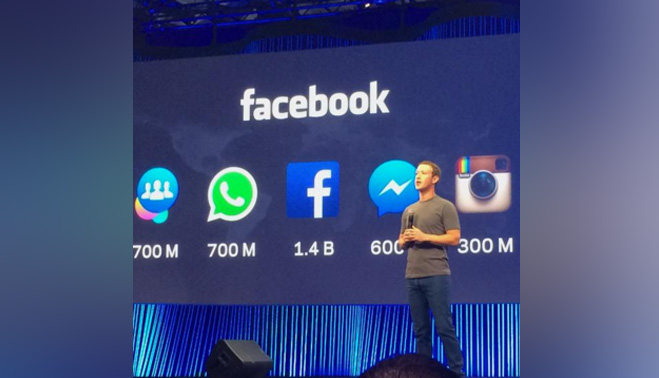![]() Home > Internet & Media
Home > Internet & Media
Facebook's Secret Weapon To Keep Your Attention: Not-Facebook

Facebook has a whole slew of products it can use to keep people in its orbit. Claudia Cruz/CNET
![]() April 11th, 2016 | 10:05 AM |
April 11th, 2016 | 10:05 AM | ![]() 3921 views
3921 views
CNET.com
The social network's orbit goes beyond its 1.6 billion members. At the F8 conference in San Francisco this week, we'll get a glimpse of what's going on outside of the "Big Blue App."
Last week, I tried to see if I could live without Facebook.
I didn't purposefully avoid it. I just wanted to figure out how much I actually use the social network that's sucked up so much of the world's time since Mark Zuckerberg created it more than a decade ago.
Turns out, I couldn't stay away. I regularly scrolled through my feed in search of interesting news items I might have missed, including taking a brief look before going to sleep. And even when I wasn't using Facebook itself, I still checked Instagram and Messenger on my phone, two apps owned by the company.
That's the secret behind Facebook, which has gone from shiny new thing for college kids to a $322 billion company: Even when we're not on Facebook, we're still floating in its orbit as we entertain ourselves with Not-Facebook.
By Not-Facebook, I mean everything else that's not part of the news feed-driven, baby picture-filled, political rant-laced social network, known internally as the "Big Blue App."
All that peripheral stuff will likely be the focus of F8, Facebook's annual conference for software developers. The annual confab, which kicks off Tuesday in San Francisco, is where Facebook announces new products and sets the tone for the company in the coming year.
"The core social network can only absorb so much," said Jan Dawson, principal analyst at Jackdaw Research. "There are other things people want to do that Facebook [the company] can help them do."
That's definitely been the case in the last few weeks. Some of the company's most interesting news has been related to products outside of Facebook. Instagram stretched the time limit for videos to one minute from 15 seconds. And there are multiple rumors that Messenger will become a hub for artificial intelligence bots and mobile payments.
And those are just Zuckerberg's mobile apps.
There's also the hype around Oculus Rift, maybe the biggest bet Facebook has ever made. The virtual reality goggles went on sale in late March, with CNET reviewer Sean Hollister calling the Rift VR experience "breathtaking." Facebook bought Oculus for $2 billion in 2014. (Last week, CNET opened its doors to the public to try out various virtual-reality headsets, and people were giddy over the Rift.)
Facebook wants to double down on those Not-Facebook bets.
Message delivered
Facebook hasn't officially explained why it calls the conference F8, but some say it's a nod to the company's tradition of 8-hour hackathons, marathon coding sprees where engineers try to build a product in one binge.
The star of the event this year is expected to be Messenger.
Facebook hopes the app can be more than just an alternative to texting, where your contact list includes all of your Facebook friends. Instead, it's hoping Messenger becomes a sort of Swiss Army Knife, allowing you to pay your roommates rent money, make phone calls and book restaurant reservations.
What's driving Messenger forward? Chat bots. These aren't physical robots, but software that can perform simple tasks for you. An example: M, a digital assistant introduced by Facebook in August that's powered by artificial intelligence and supervised by a team of people. M can do things like buy tickets to a movie, book travel arrangements or have flowers delivered for you. It's still in the testing phase right now and available only to a few thousand people.
Facebook wants as many people to experiment with chat bots as possible, which is why it's expected to announce software at F8 that makes it easier for developers and companies to create their own bots. Those bots, for example, could act as customer support reps for big brands.
Big blue updates
Even with all the emphasis on Not-Facebook, Zuckerberg and his team are still building out the Big Blue App.
That includes adding Facebook Live, a service that lets you broadcast live video on Facebook using a smartphone camera (like Periscope). Last week, the company unveiled a slew of new features for the product, including filters that dress up the video -- like the photo filters available for Instagram. (Last Friday, the Internet was enthralled by an exploding watermelon on a Facebook Live video, courtesy of BuzzFeed. As many as 800,000 people tuned in at one time.)
And in February, Facebook blew up its world famous Like button -- a feature so iconic to the service that a picture of the thumbs-up greets visitors to Facebook headquarters in Menlo Park, California. Now, instead of tapping on one button to express your thoughts about a post in your feed, you can choose from an entire gamut of emojis -- from Love to Sad to Angry.
At F8, Facebook is also going to open up its Instant Articles pages to publishers everywhere. That will allow article pages by those publishers to load instantaneously on smartphones. Up until now, Instant Articles were available from only a few hundred media organizations, including The New York Times, Washington Post and BuzzFeed.
But here's the thing: If I read anything interesting in any of those superfast-loading articles, I'll probably chat about it with my friends on Messenger -- or some other place that's Not-Facebook. Just not Facebook.
Source:
courtesy of CNET
by Richard Nieva
If you have any stories or news that you would like to share with the global online community, please feel free to share it with us by contacting us directly at [email protected]